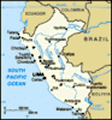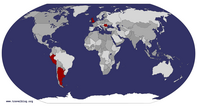Advertisement
Published: August 5th 2011
On the morning of my intended travel to Aguas Calientes, in the foothills of Machu Picchu, I awaken with a gloriously bad headache. Being in the land that brought us the ¨Pisco Sour¨, I can hardly blame myself, though I was pleasantly surprised at my own ability to stomach so much egg white in an alcholic beverage. Trudging down to the restaurant, I decided on a light breakfast- less for the altitude issue and more for my distrust of my own stomach. My lift to the train station arrived pretty late. We then had to pick up a couple at another hotel before arriving at the station. On the way, after some small talk chatter with the couple, who asked where I was from, I made the comment that I was from England, ¨Which was an awful awful curse...¨, believing they would appreciate some self deprecative jolity. However, the husbund, (as I have experienced with touring couples, is often the case) did not speak much, and I assumed he was Texan, like his wife. He was in fact English himself, and as he for the next 15 minutes divulged, was vigourously proud of it...
Coming to an awkwardly quiet stop
outside the station I said a murmured farewell to the couple, having just heard an implied lecture on why Wool was simply better than other places, and tipped the driver. Skulking onto the station platform at Poroy on the outskirts of Cusco, I see a number of large blue and gold carriages awaiting our arrival. Since we arrived late, the train is already full. I find my seat, which has been courteously left available for me despite the crowdedness of the carriage, and we begin our three hour journey into central Peru.
The train travels in gorges between the snow-peaked mountains and the tentative beginning of Amazonian flora. Below us the Urubamba river roars over the sound of the train itself, and flicks droplets of water onto the windows. Whenever we break, our vessel shows her age and screeches and shudders along the bends, creating a humourous head-banging action among the sleeping passengers. Eventually the noise wakes them up, only to spill coffee on their laps, and be laughed at by an unsympathetic boyfriend... In his defence, it was pretty funny.
This train, I read from my route information sheet, takes an ingenious series of zig-zag motions to traverse the
steep climbs in the region. We must reach an altitude of 2040 metres for the station in Aguas Calientes (literally, ¨Hot Waters¨), but I'm not preoccupied with that, and so far my asthma hasn't presented itself. At the station in AC, we meet our guide, Mario, and begin to make our way to the bus station. The buses come every five minutes, transporting a stream of visitors an extra 400 metres up a mountainside to the breaktaking views of Machu Picchu. On the way, el paisaje extraordinario! The scenery truely is extraordinary. At your side, you can see the ¨Happy Mountain¨ and the little settlement of AC seemingly dipped in dense jungle, the ever-present Urubamba weaving its way through the buildings. At the top of the road, we come to a ¨base camp¨ area, if you will. There's a restaurant with insane prices, public toilets with insane prices, and, to actually enter Machu Picchu, an insanely long line. Being of fair skin, I can tell you that it was not pleasant standing in that line for the time that I did. The altitude compounds the intensity of the Sun so that now, there's a lump of dead flesh on the
top of each of my ears. But I guess it gives me something to do on the flight back...
Machu Picchu itself is rather incredible. Once we got through the highly unnecessary passport check at the ticket office, we were split into two groups- the tour in Spanish and the tour in English. Because my Spanish is so good now, I went with the Spanish group. Aha! Bazinga! Who am I kidding? I went with the English group... All joking aside though, I did understand a good deal of the parts of tours in Spanish I sat through. So, through some lucky happenstance, the language has seeped into my subconscious. I still need a good twenty years here though to speak correctly in it.
Walking through the citadel of Machu Picchu is a humbling experience. Our guide gave many theories as to how it could have been used- a university, a jungle retreat for nobles, a safe haven against invasion or religious capital. The truth is, noone knows. Whatever it was used for, the almost superhuman effort and vision it must have taken to create it, for me, is staggering. I had imagined, before coming here that it would be
relatively small- it's portraits may have made it seem bigger than it was. But in fact it's the other way around. There is a vastness about the place, in harmony with the landscape it occupies. The huge numbers of tourists at the base of the mountain pales into insignificance. Like ants they clambered about the structures. From our viewing position, the Incan civilisation certainly seemed the more impressive. While I was up there I met a very nice sextuple degree-holding Kashmiri-Canadian woman in our tour group by the name of Dr. Kachroo, who is, I now know, a bad person to sit next to when rumbling back down a mountain in a rickety bus. But she did pay for lunch when I got down, so I guess that makes up for it.
Aguas Calientes is a beautiful little town aswell, well worthy of some time looking around. Especially by the train station, where a litter of stands sell all manner of souvenirs. The restaurants are excellent too, synthesising Peruvian local cuisine with that of more international appeal. Also interesting is the ubiquity of English. I hardly needed to know Spanish in that area. This may not be surprising for many,
as it is after all a place propped by tourism, but coming from the context of the rest of South America, it's as if a little section of the Anglosphere were dropped in the middle of the Peruvian rainforest. AC is however, a small town, and if you start to feel bored, follow the railway tracks into the jungle for a while. It's parallel to the Urubamba, and you'll hit some great scenery up there, along with some fascinating wildlife. After a few days of taking baths, I took the train back to Cusco, and boarded my water-wrinkled behind on a bus heading for the province of Pisco, nearest to Lake Titicaca, the highest lake in the world. We also passed through a city called Juliaca, the perpetual construction site. In Juliaca, we are told families pay lower taxes if their homes are left unpainted, unfinished and in many instances, unstable. Large piles of rubble lie on roads and metal poles stick out of the top of walls, awaiting subsequent floors to be placed above. The lack of aesthetic has caused the city to be an important base of operations for a booming black market. Counterfeit electronics are sold here,
but not exclusively. We travel on to Puno, stretched over the hills surrounding Lake Titicaca. Much like Juliaca in it's choice of ¨look¨, it is slightly more palatable given it's proximity with the Lake and the opportinities for tourism that offers.
The morning after I arrive in Puno we're onto the Lake. Massive as it is, it's split down the middle between Peruvian and Bolivian territories. We get on a motor boat that takes us to the Islas Uros, a set of fifty artificial islands constructed by the native people here from turf and reeds. The ancestors of these people have been living here since the advent of the Inca. They greet me in good English, and after a demonstration of building techniques, the leader of the village, introduced by our tour guide Leo as ¨The Chief¨, shows me into his home where his wife and daughter are sewing. He asks whether I want to take a picture, but I feel strange taking photos of the inside of his house when hes standing right there. I let the others go ahead. I ask if they've ever had accidental fires, since the whole island is made of reed. He replies that
yes, only a couple of years ago there was a large fire that engulfed half the village, but once every couple of years, the material is replaced regardless of fire damage to keep the supports strong. That year, it just needed to be replaced early. The village has a few solar panels, which power one black and white television and a radio. I buy a piece of embroided cloth from his family stall which took 3 months to make. He acknowledges it's a little overpriced for the tourists, but I buy it at full price anyway. With any luck they might afford a new solar panel. Next, we travel by boat away from the floating islands to a set of natural islands, where there are communities that date from a set of Catalan explorers in the 14th century. They all wear native costume, I suspect for the tourists, but their lifestyle is not easy. Every day, an average islander must carry up to 40 kilograms of resources from the mainland up a very steep hill to the centre of the community. I did the trek myself, and it wasn't for the faint of heart.
After a night in Puno, I
set off to Juliaca airport to board a flight back to Lima and my final days in South America come into sight. For five months I've taught and travelled, met incredible people and tried to get away from others, seen fantastical places and humbling poverty. An experience this long and this profound is always mixed, but I learned more than I could have hoped for. On our boat trip across Lake Titicaca, I laughed when I heard some were bored. This, I can truely say, was never boring. I'll leave you with a poem that I wrote on the boat, and I hope you understand my meaning.
Upon cyan cliffs find mirrors to
Our fond memories of warm rays,
And rust-white bars lift wind drenched
Curtain in patterned form; the light of clouds,
Some whispy long 'cross flat island.
In fractal shape they dip to reality's edge,
With cuts and burns through water's base.
We injure our way along weeping desert,
Towards contracted green, eroding motion
Against Sea. People move about in illegitimate
Perception- of that substance antithesis
Of grounded Life and the bias Mother to
Her Daughter's smooth movements.
Our comrades similarly slink the environment's
Road so we
meet later on and swap notes
Of beauty's vast tedium in unappreciative words,
Saying we could have done better,
Given half the chance.
Advertisement
Tot: 0.093s; Tpl: 0.014s; cc: 13; qc: 47; dbt: 0.0392s; 1; m:domysql w:travelblog (10.17.0.13); sld: 1;
; mem: 1.2mb



















Cass
non-member comment
Frickin amazing
Wow. What a great writer you have turned out to be. Can't wait to see you again little bro. I've missed you and been amazed at every step of your journey. Looking forward to hearing more about it. Lots of love and pretty soon hugs! Cass x x x x x x